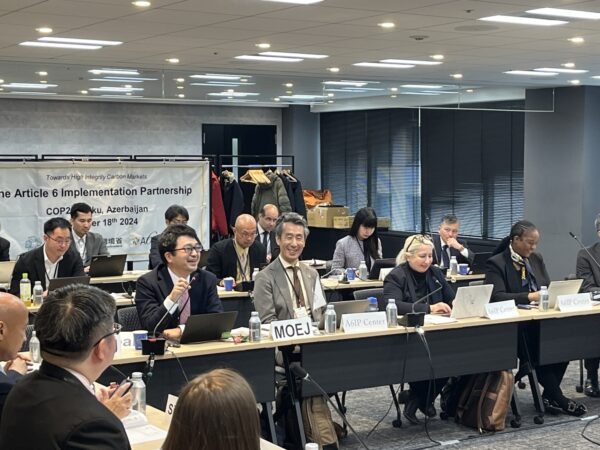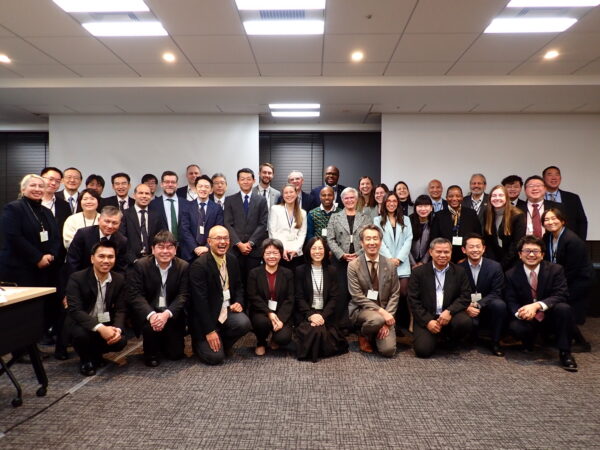
Press Release: Advancing Article 6 of the Paris Agreement: Second Advisory Group Meeting in Tokyo
The Paris Agreement Article 6 Implementation Partnership (A6IP) Center, with the Institute for Global Environmental Strategies (IGES) serving as its secretariat, convened its second Advisory Group Meeting in Tokyo on 11 and 12 March, 2025.
The A6IP Advisory Group Meeting serves as a platform for key practitioners engaged in Article 6 of the Paris Agreement to exchange information and address challenges related to its implementation and oversight. Convened for the first time since Article 6 became fully operational—following the conclusion of negotiations at COP29 in November 2024—the event brought together approximately 90 participants, including representatives from national governments, implementation support organisations, and private-sector entities. Attendees shared updates on the status of initiatives for greenhouse gas emission reduction and carbon removal, and exchanged best practices and experiences concerning the development and execution of such projects. Discussions also covered the challenges and future direction of Article 6-related activities, including the conditions for utilising the independent crediting mechanism in accordance with Article 6 guidance. Participants further exchanged views on the A6IP’s planned activities for FY2025, as well as on the proposed Mid-term & Long-term Plan for the period spanning 2030 to 2050.


Summary of the meeting
Session 1: Global Status of the Paris Agreement Article 6 Implementation, Projects and its Potential
The A6IP Center presented an overview of the global status of Article 6 implementation under the Paris Agreement, based on its “Paris Agreement Article 6 Implementation Status Report (A6ISR)”, published in November 2024. Following the presentation, the Center facilitated a discussion on anticipated developments and key challenges moving forward.
Despite a shared interest in implementing Article 6, participants noted that—as of November 2024—only 286 projects were utilising Article 6 on a bilateral basis. They emphasised the need to integrate their existing operational frameworks to ensure consistent evaluation of the reporting and verification (MRV) processes. In this context, sharing practical experiences from both ongoing and past projects was deemed essential to enhancing collaboration with the private sector meeting future demand for carbon credits. In fact, about 9,000 projects are in the pipeline under the independent carbon standards, indicating the growing demand for high-quality carbon credits.
Session 2: Article 6 Project Development Success Stories and Business Matching Experiences
Private sector representatives shared success stories from projects generating credits through methane emission reductions in India and emission reductions in the transportation sector in Ghana and Thailand through electric mobility. Key success factors include stakeholder commitment, clear guidelines, transparent systems and experiential learning programmes. However, several challenges were also noted, including issues related to financing, regulatory complexity and susceptibility to intergovernmental negotiations.
Session 3: Promoting high integrity and use of independent crediting programmes for Article 6
The third session was based on the "Principles of High Integrity Carbon Markets", which were adopted as an annex to the communiqué of the G7 Ministers' Meeting on Climate, Energy and Environment in Sapporo, organised in April 2023. The discussion focused on three main points:
- Diverse approaches to high integrity: Participants highlighted various ways to promote high integrity practices toward the implementation of Article 6 through independent crediting programmes.
- Role of independent programmes: These programmes can create eligible methodologies, support countries in using high-integrity standards, and align efforts with Article 6 goals.
- Need for standardisation: There is a clear need to harmonise and standardise Article 6 infrastructure, with templates and guidelines helping countries implement effectively.
Session 4: Addressing challenges and possible approaches to promote Article 6 project formulation and strengthen Article 6 implementation
The A6IP Center presented its capacity-building efforts, providing examples such as in-person workshops in Bangladesh and Lao PDR, to support the implementation of Article 6, along with key challenges identified in the “Article 6 Implementation Status Report” (A6ISR). It also outlined how A6IP’s ongoing and planned activities could help address these challenges. The discussion focused on three main points:
- The importance of building upon resources and expertise gained from the Clean Development Mechanism (CDM) under the Kyoto Protocol, Joint-Crediting Mechanism (JCM) and knowledge of Article 6 of the Paris Agreement.
- Sharing experiences and promoting dialogue among stakeholders by consolidating and disseminating information on good practices, including case studies and lessons learned.
- Leveraging climate finance by finding pathways to support the implementation of Article 6 of the Paris Agreement.
Session 5: A6IP's activities for 2025 and Mid-term & Long-term Plan
The A6IP Center gave a presentation on the activities that it has planned for FY2025, as well as introducing the draft of its Mid-term & Long-term Plan. Particular emphasis was put on the importance of enhancing further international cooperation and acknowledging the relevance of partnerships toward achieving a net zero society.
Participating countries and organisations shared opinions in the context of project development and implementation, and commented on the issues and activity goals that the A6IP's various partners and the A6IP Center itself should address to fulfil future goals.
Related Links
- A6IP Center’s Report “Paris Agreement Article 6 Implementation Status Report” (November 2024)
- “Principles of High Integrity Carbon Markets”. Annex of the G7 Climate, Energy and Environment Minister's Communique at the G7 Ministers' meeting on Climate, Energy and Environment in Sapporo (April 2023)
Participating countries and organisations
Commonwealth of Australia, Commonwealth of the Bahamas, Canada, Republic of Chile, French Republic, Federal Republic of Germany, Italian Republic, Republic of India, Republic of Indonesia, Kingdom of Norway, New Zealand, Republic of Singapore, Kingdom of Sweden, Kingdom of Thailand, United Kingdom, Asian Development Bank (ADB), European Bank for Reconstruction and Development (EBRD), Climate Action Data Trust (CAD-TRUST), Global Green Growth Inistitute (GGGI), Organisation for Economic Co-operation and Development (OECD), Inter-American Development Bank (IDB), IETA, United Nations Development Programme (UNDP), UNEP Copenhagen Climate Center (UNEP-CCC), United Nations Framework Convention for Climate Change (UNFCCC) Secretariat, United Nations University Institute for the Advanced Studies of Sustainability (UNU-IAS), World Bank, The European Roundtable on Climate Change and Sustainable Transition (ERCST), The Integrity Council for the Voluntary Carbon Market (ICVCM), Voluntary Carbon Markets Integrity Initiative (VCMI), Global Environment Centre (GEC), The Institute of Energy Economics, Japan, Gold Standard, Ministry of the Environment Japan, Institute for Global Environmental Strategies, Paris Agreement Article 6 Implementation Partnership Center
Photo Gallery
Tagged with































